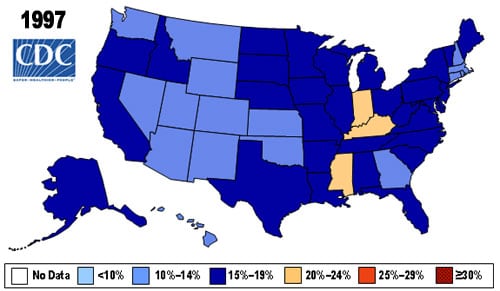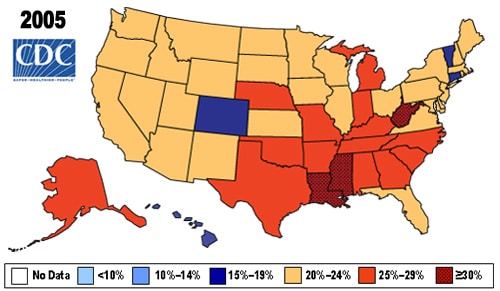Shade Parade is dedicated to creating sidewalks, that are walkable, in Nashville. In so doing, Shade Parade hopes to entice Nashvillians to get outside and use their bodies for transportation.
At first glance, the article below would seem to have little connection to sidewalks. But, actually it intimately reveals why we need to create a culture of walkability in our cities.
Tennessee is the second most obese state in the US.
Greater than 30% of adults in Tennessee are obese. We didn't start out that way…
One factor in this alarming shift towards obesity is the minimization of walkability sharply noted in Nashville. The practicality of just putting on a pair of shoes and hiking to your destination is fraught with trouble.
Frankly, many drivers are hostile towards pedestrians. Many locations in Nashville lack sidewalks out-right. Some sidewalks are unsafe to walk or are inconsistent. This lack of homogeneity (see Sidewalk Project #1, #2, & #3 below) in walking paths leads to increased tension between drivers and walkers as pedestrians sometimes make seemingly erratic choices in when to cross streets and where to walk (see articles about pedestrian vs vehicle accidents below).
Hillsboro Pike in Green Hills is a clear example. It is, distance wise, very walkable. But the obstacles are numerous.
So, what does a used T-shirt vendor in Western Kenya reflect about Nashville's walkability? It is in our rate of obesity - our secondhand T-shirts sold in foreign countries are literally useless unless tailored down to fit.
'They fit almost no one here'.
Having essentially a single option for transportation - the car - clearly is of limited benefit.
The fact is - you have the right to walk. And, walking may just be the best thing for you…
Source: NPR
Copyright ©2013 NPR. For personal, noncommercial use only. See Terms of Use. For other uses, prior permission required.
All last week, we brought you the story of T-shirts commissioned by NPR's Planet Money Team. The story had many chapters, beginning in a cotton field in Mississippi. That cotton was then wound into yarn in Indonesia, sewn in Bangladesh and Colombia. And the finished shirts were shipped back to consumers here in the U.S. But what happens to our shirts when we're done with them?
Today, in our final story from the Planet Money series, The T-shirt Afterlife, we're going to hear from NPR's Gregory Warner and first, David Kestenbaum.
DAVID KESTENBAUM, BYLINE: When Jeff Steinberg was in high school, he played a lot of lacrosse which is why he had this shirt: A maroon and white tank top.
JEFF STEINBERG: Had Denver Lacrosse written on the front with a couple lacrosse sticks crossed. And my number that season was Number 5. So it had Number 5 on the back.
KESTENBAUM: Jeff wore the shirt for years - in the backyard, at the beach. Then one day he cleaned out his closet. We've all done this, worn and loved some piece of clothing and then decided it's time. Jeff took good old Number 5 down to Goodwill. He remembers the place - Miami, SW 146th Street near US 1. Which he thought was the end of things.
But then months later he was in Africa, Sierra Leone for work, walking down the street and he sees this guy selling ice cream and cold drinks, wearing a shirt. It's maroon and, yes, it has lacrosse sticks on it.
STEINBERG: It was Denver Lacrosse one and I thought, wow, this is like pretty crazy. He has this lacrosse jersey from that team.
KESTENBAUM: Then Jeff looked at the back of the shirt. And there was the Number 5 - his number.
STEINBERG: It was really a mindbender.
KESTENBAUM: Jeff tries to explain to the guy, hey, I know this shirt - I think it was mine. But the guy doesn't speak English and they part ways, leaving Jeff to wonder about the very strange journey his shirt must have taken.
STEINBERG: I spent a lot of time...
(LAUGHTER)
STEINBERG: ...thinking about that over the following days. It was just sort of beyond me how it could have gotten there.
KESTENBAUM: Well, Jeff, today we have an answer for you. Because it turns out it is not just your shirt. The Planet Money shirts, and a lot of our clothing, will eventually make this epic voyage. The U.S., in fact, is the largest exporter of used clothing in the world - over one billion pounds every year.
What happens is that charities like Goodwill, they just get far more clothes than they can use. So a lot of the clothes get sold in bulk, packed in bales, and sent across the ocean on a containership, where they begin an entire second life. Many of the bales are headed to Africa.
And here's where I'm going to pass things off to Gregory Warner, our correspondent in Kenya.
(LAUGHTER)
GREGORY WARNER, BYLINE: I'm in a shed in downtown Nairobi, where some of those bales of clothes end up. This particular shed is a bit bigger than a two-car garage. It's stuffed from the dirt floor to the tin roof with bales. And at the door sits a woman named Jane Ireri. She's got tight blond braids. She's sipping sweet white tea.
(LAUGHTER)
WARNER: So I want to describe where you're sitting. I mean, so I found you here. You're sitting on a bench but you're surrounded essentially by, like, 70 bales?
JANET IRERI: Five-twenty bales.
UNIDENTIFIED MAN #1: Five hundred and twenty bales.
WARNER: There's 520 bales here?
Turns out she dug a whole sub-basement under her shack, with more than 200,000 pieces of used clothing she shipped in from New Jersey, London, Toronto. And it's all under here.
IRERI: Yeah.
(LAUGHTER)
WARNER: Once Jane sells each bale, it heads out the door straight into the biggest market in Nairobi. It's called Gikombo.
(SOUNDBITE OF MUSIC)
WARNER: There's a whole section of street just for denim, another boulevard of bras. We're, of course, on the street of T-shirts where vendors have laid out their wares on horse carts. And these shirts are washed. They're ironed. They're carefully folded. It's more like shopping at The Gap than Goodwill - only, if The Gap had a very strange product line.
Just to pick at random from one cart - there's a fundraising T-shirt for a cancer charity, a promotional shirt for The Not So Newlywed Game. A conventional souvenir shirt from Broadway New York. And, oh my God, Jennifer's Bat Mitzvah, November 20th, 1993. This shirt has been around. It's remarkably good condition though for being 20 years old.
Now, the original owners of these shirts, of course, had some connection to these things. They went to that bat mitzvah. They supported the charity. They visited Broadway at some point. So all these shirts were acquired and valued for reasons that cannot possibly apply here in Kenya.
What are you looking for? You seem like you're looking very closely - very quickly.
MARGARET WANJIKU: (Foreign language spoken)
WARNER: Margaret Wanjiku is a T-shirt vendor from Western Kenya. She's putting T-shirts in yes piles and no piles. She comes here to Gikombo every couple weeks by overnight bus. She buys as much as she can carry back to sell. And so, she told me through a translator, she has to be very careful about what she picks. She's not looking at the writing so much as the condition of the shirt.
WANJIKU: (Through Translator) I'm looking at the smartness of the T-shirt? And so, I'm guided by the quality and the condition of the T-shirt.
WARNER: And what about what's written on it, does that matter?
WANJIKU: (Through Translator) Yeah, I look at the writings because there are some writings that appear abusive and my customers may not like them.
WARNER: Abusive, what do you mean by abusive? For instance, that T-shirt over there says: I'm The Guy You Have To (CENSORED) To Get A Drink Around Here. So this, she would not buy because this is offensive, right? Or is this OK?
(LAUGHTER)
WANJIKU: (Foreign language spoken)
WARNER: What did she say?
WANJIKU: This may not be abusive.
WARNER: Not abusive, but it's committed an even worse sin.
WANJIKU: It seems to be so big it may not get a customer.
WARNER: It's size extra large. And here lies the wide gulf between the Western T-shirt market and the African physique. Many of the used shirts that pop out of a bale in Africa simply cannot be sold as is. They fit almost no one here.
Which is where this guy comes in.
FRANCIS MUNGAI: (Foreign language spoken)
WARNER: Francis Mungai commutes to Gikombo market every day from the Kariobangi slum of Nairobi. He carries a pair of scissors. His job, downsizing extra large T-shirts, now in a big pile at his feet. He picks up a faded black T-shirt for the heavy metal band Motorhead.
MUNGAI: (Foreign language spoken)
WARNER: OK. So you cut the sides off and you cut the bottom off.
MUNGAI: (Foreign language spoken)
UNIDENTIFIED MAN #2: You make it a small size, after that...
MUNGAI: Another color.
UNIDENTIFIED MAN #2: And you make another color.
MUNGAI: Another color. Mm-hmm.
WARNER: Oh, you take another color.
The canary yellow sleeves from some other useless extra large - now echoing the yellow fringes of the Motorhead logo. This design choice is made in seconds. And then he hands the sleeves and the shirt to a seamstress named Caroline. She adds two more scraps from two other T-shirts, pale blue accent for the seam, turquoise for the collar.
(SOUNDBITE OF SEWING MACHINE)
WARNER: And as Caroline stitches all this together on her Singer machine, it's going to take a minute, so let's just pause to consider the first life of our Motorhead shirt. Assembled, in stages, all over the world, sold perhaps in the United States for top dollar at some show. Worn for years, but eventually discarded maybe on a pile in Goodwill.
The moment that shirt left the United States and got on a ship to Africa, it entered a whole new supply chain but reversed, because now, the finished shirt is the raw material imported to Kenya for 15 cents. Resold and sold again for 45. Someone got 12 cents to cut it up, 18 to tailor it, 14 to wash and iron, finally a vendor bought it for a dollar-20 to hawk it off to its future wearer, who, for just 2 or $3, owns a bespoke artisanal Motorhead shirt whose tag says XL, but fits like a small, with a cheerful blue collar and some rather jaunty yellow sleeves.
I'm Gregory Warner in Nairobi.
KESTENBAUM: And I'm David Kestenbaum, NPR News.







No comments:
Post a Comment